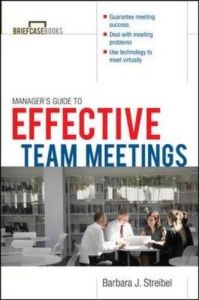This is a handy, short, to-the-point guide about how to conduct meetings. Much of what author Barbara J. Streibel says is common sense, but any manager charged with running meetings knows how quickly common sense goes out the window in that setting. The author covers all of the bases and provides a series of useful checklists to help harried managers meet more effectively and efficiently. Streibel also provides many helpful references to other books that discuss specific techniques and practices. While little here is wildly original, getAbstract.com finds that the author gives fresh, lucid and practical treatment to tried-and-true guidance.
The Best and the WorstMeetings can be useful and valuable or they can be a huge waste of resources. You’re the manager and it’s up to you to make the difference between a great meeting and a poor one. Meetings can go wrong for lots of reasons. Some of the problems occur well before the meeting begins, some take place at the beginning, some happen in the course of the meeting and some crop up after it is over. Almost all are preventable. Good meetings are worth the effort. Preparation for the MeetingPlan and prepare if you want to conduct a good meeting. First be sure a meeting is the best way to achieve your purpose. Develop an agenda that clearly states the purpose, the sequence of events and topics, and the roster of people who need to attend. Note what part of the meeting each person should attend and why. Make preparation a team effort since two (or more) heads and sets of contacts are better than one. Expect problems and prepare for them.Make sure you have a good reason for a meeting and, if you don’t, don’t hold it. Your goals should be simple, concise, specific, precise and clear. Such objectives break the purpose of the meeting into manageable chunks and help you determine...
Barbara J. Streibel is co-author of The Team Handbook and Building United Judgment: A Handbook for Consensus Decision Making. She is a consultant and manager of intellectual capital at Oriel Incorporated, a consulting and training firm in Madison, Wisconsin.













Comment on this summary